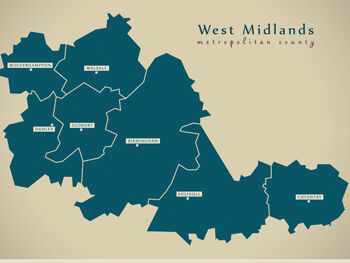University News Last updated 10 June 2020

The West Midlands Combined Authority has formally adopted the West Midlands National Park project as a key component of a post-Covid green economic recovery.
With the youngest, fastest-growing, most diverse population in the UK, the imminent arrival of HS2, the hosting of City of Culture 2021 and the Commonwealth Games, the West Midlands National Park is a unique opportunity to re-discover a vast, hidden landscape that has been largely overlooked and undervalued for decades. A game changer, it will become the benchmark to which others measure against and will demonstrate a truly holistic approach to the management of the environment in the most sustainable way for now and into the future.
During the COVID-19 pandemic we have seen how important access to green space and nature has been for people’s physical and mental health. According to Sport England’s Active Lives survey 63% of people are now saying that being able to exercise and relax outside is more important than ever before.
In response to COVID-19 people are connecting more extensively with their neighbourhoods. The revaluating of place, experience and identity, the growing importance of the environment and the need to move towards a zero-carbon and thriving green economy will now be accelerated through the creation of a National Park for the 21st century, including the entirety of the West Midlands landscape, its waterways and green spaces, towns and cities.
Formally adopted on the 5th June by the Board of the West Midlands Combined Authority, the West Midlands National Park project will result in a region-wide spatial vision to kick-start the post-Covid economy in the context of WM2041, the West Midlands zero-carbon strategy and accelerated brownfield-first house building. It will also provide an overarching context for a range WMCA post-Covid recovery interventions, and a roadmap to increased and inclusive regional prosperity, spatial and environmental justice and growth where no one is left behind.
The WMCA has committed to tackle the Climate Crisis with inclusivity, prosperity and fairness, as described in the WM2041 policy document. There is a clear recognition that the zero carbon challenge needs to attacked at speed, but in a way that yields scalable, replicable and sustainable solutions. Key to success will be the need to create better, more easily accessible places offering a high quality of life, wellbeing and environment. This project will explore and define approaches to planning, construction and connectivity that minimise environmental impact, carbon emissions and detrimental effects on air quality. It will strive to give a sense of hope to all of our communities, especially those hardest hit by the pandemic.
Andy Street, Mayor of the West Midlands said: “The National Park presents a brilliant opportunity for a region as vibrant and ambitious as the West Midlands. Our vision is for this urban National Park to be unlike any other, with which all communities and every part of civic society can engage.
Professor Kathryn Moore, Director of the West Midlands National Park Lab said “the West Midlands National Park is a fresh way to look at our landscape, its history, culture and potential. A proposal for a 21st Century National Park rather than a traditional National Park, it has a very different and unique approach. A long-term economic proposal it will give the region an advantage that quite literally comes with its territory, transforming its identity and creating a healthier, better quality of life, environment, education and jobs for the future."
Professor Julian Beer, Deputy Vice Chancellor of Birmingham City University said “BCU is delighted to receive this endorsement and support for a project that is truly of the moment. The West Midlands National Park project has the potential to transform the way that the region prepares itself for the future, ensuring that all of our environmental, societal and economic goals are met while improving the quality of life for everyone. Beyond this, it creates huge opportunities to further enrich our teaching and research as a university."
Dr Robin Daniels, Managing Director of Redpill Group Ltd, which has been working with Birmingham City University on the development of the West Midlands National Park said “This is primarily an economic proposal, which is rooted in the journey to a zero-carbon economy and embedded citizen engagement. The West Midlands National Park approach is right at the cutting edge of sustainable development and the global smart city movement. This project is internationally significant and will become a key strategic asset for the region and the UK.”